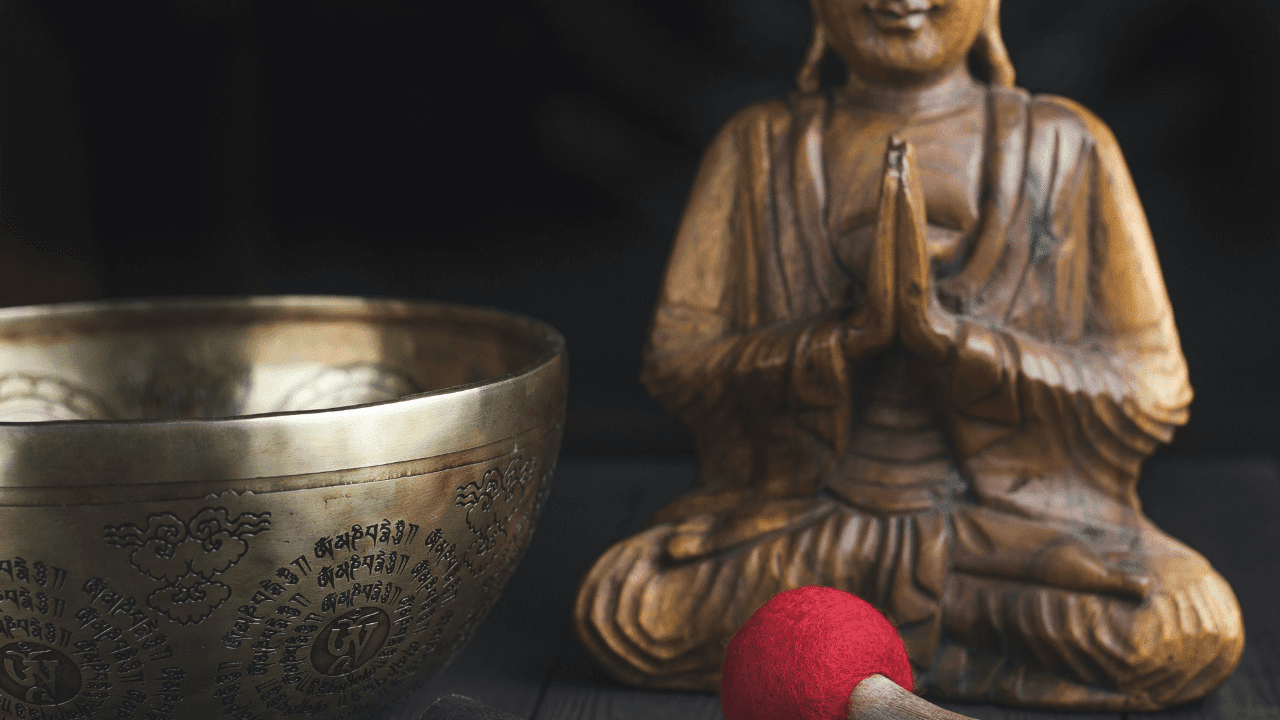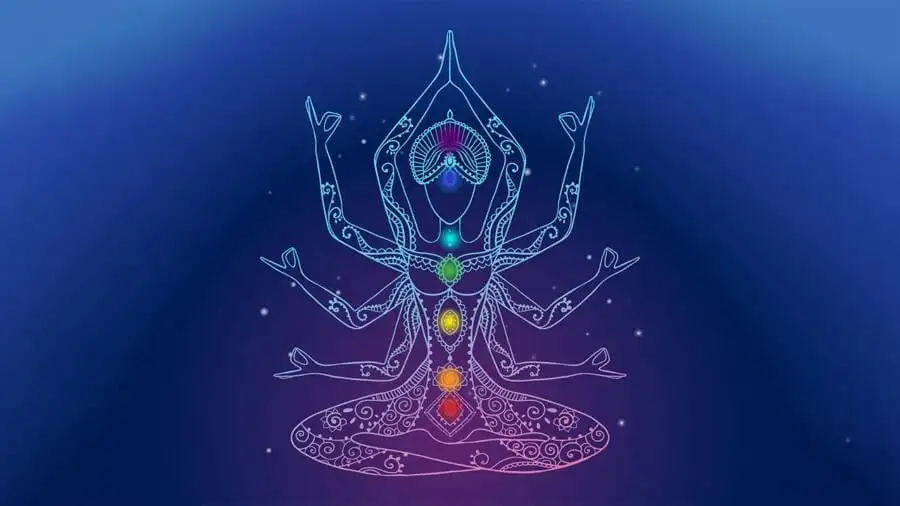Sound is a powerful force. It can evoke emotion, inspire us, or transport us to another place and time.
For thousands of years, people have recognized the impact of sound vibrations on our physical, mental, and spiritual well-being. Chanting and mantras are two ancient practices that utilize sound vibrations to promote healing, relaxation, and transcendence.
Definition of chanting and mantras
Chanting involves repeating a word or phrase over and over again in a rhythmic manner. The word or phrase can be in any language or even a sound without meaning.
On the other hand, mantras are sacred words or phrases used in Hinduism and Buddhism to focus the mind during meditation. They are believed to have spiritual power that can transform consciousness.
Brief history of chanting and mantras
Chanting has been practiced for thousands of years across the world in different cultures as part of religious ceremonies or as a form of meditation. The earliest known reference to chanting comes from Vedic scriptures dating back around 1500 BCE in India.
In ancient Greece, chanting was used as part of healing rituals by physicians such as Hippocrates. Mantras have been used for centuries in Hinduism and Buddhism as a form of devotion or to achieve spiritual enlightenment.
In Hinduism, mantras were first mentioned in the Rigveda texts around 1500 BCE. In Buddhism, mantra recitation is an important aspect of Tibetan Buddhism where it is believed that repeating certain mantras can lead to enlightenment.
Importance of chanting and mantras in different cultures
Chanting and mantras have played an important role in various cultures throughout history. In Christianity, Gregorian chants were developed during medieval times to enhance worship and evoke a spiritual experience.
In Islam, the recitation of the Quran is considered a form of chanting that helps believers connect with God.
Native American cultures use chanting and drumming to communicate with the spirit world and promote healing. Chanting and mantras are ancient practices that have been used for centuries to promote physical, mental, and spiritual well-being.
They are an integral part of different cultures around the world, offering diverse ways to connect with oneself or a higher power.
In the following sections of this article, we will delve deeper into the science behind chanting and mantras, explore different types of chants and mantras, their benefits as well as how to practice them effectively.
The Science behind Chanting and Mantras
How sound vibrations affect the body and mind
Chanting and mantras have been used for centuries to promote mental, emotional, and physical well-being. The scientific explanation behind this lies in the impact of sound vibrations on the human body.
Sound travels in waves, which can create positive or negative responses in the body depending on their frequency, amplitude, and other factors. When we chant or recite a mantra, our vocal cords vibrate at a certain frequency that resonates with different parts of our body.
This creates a calming effect on the nervous system by slowing down brain waves and reducing stress hormones like cortisol. Additionally, specific mantras are believed to have healing benefits for different organs or systems in the body by stimulating or balancing their energy centers.
The role of the brain in processing sound vibrations
The way our brain processes sound vibrations also plays a significant role in how chanting and mantras affect us. When we hear sounds, they travel through our ear canal and are converted into electrical signals that are sent to various regions of the brain for processing.
Research has shown that certain areas of the brain are particularly active during chanting or listening to certain types of music.
For example, studies have found increased activity in areas related to emotion regulation and self-awareness during Tibetan Buddhist chanting practices. Other types of chants have been shown to activate reward centers in the brain associated with feelings of pleasure and motivation.
The impact of chanting on mental health
The benefits of chanting and mantras on mental health are widely recognized across cultures.
One reason for this is due to its ability to reduce symptoms related to anxiety disorders like panic attacks, obsessive-compulsive disorder (OCD), post-traumatic stress disorder (PTSD), among others.
In addition to reducing anxiety symptoms, regular chanting practice has also been found to improve mood, increase self-esteem, and promote better sleep quality.
It can also help individuals experiencing depression by promoting an overall sense of relaxation and well-being. In some cases, chanting may be used as a complementary therapy in combination with other forms of treatment like cognitive-behavioral therapy (CBT) or medication.
Overall, the science behind the positive effects of chanting and mantras on the body and mind is fascinating. By understanding how sound vibrations impact our brain waves and nervous system, we can better harness the power of sound to promote greater well-being in our daily lives.
Types of Chants and Mantras
Religious Chants
Chanting has been a part of many religious traditions for centuries. Religious chants are usually specific to a religion or a sect and are used as a means to connect with the divine.
For instance, Hindus chant ‘Om’ or ‘Aum’ which is considered the sound of the universe and is believed to resonate with all living beings. Buddhist chants include ‘Nam-myoho-renge-kyo’ which translates to ‘devotion to the mystic law of cause and effect’.
Christian chants include Gregorian chants that have been sung by monks in monasteries for centuries. These chants are usually accompanied by prayer or meditation.
Healing Chants
Healing chants are specific mantras or sounds that are believed to promote physical, emotional, and spiritual healing. Native American chants use drumming, singing, and dancing as a means of connecting with nature and healing the mind and body.
African tribes have their own unique types of chanting that involve repetitive sounds accompanied by drumming. The Khoisans tribe in Southern Africa uses chanting as a form of communication as well as for healing purposes.
Personalized Mantras
Personalized mantras are specific words or sounds that an individual creates based on their own needs. These mantras can be used for everything from overcoming fears to finding inner peace.
They can be simple phrases such as “I am confident” or “I am at peace”, or they can be longer affirmations that help an individual focus on what they want to achieve in life. Personalized mantras can be used during meditation sessions or simply repeated throughout the day as a reminder of one’s goals.
Whether it is religious chanting, healing chanting, or personalized mantras, each type offers unique benefits for individuals seeking to improve their physical, emotional, and spiritual well-being.
The key to finding the right chant or mantra is to experiment with different sounds and words until you find one that resonates with you personally.
Benefits of Chanting and Mantras
Chanting and mantras have been widely used across different cultures to promote mental, emotional, and spiritual well-being.
The benefits of chanting and mantras are numerous, including reducing stress and anxiety, enhancing focus and concentration, boosting self-confidence, among others. In this section, we’ll explore each of these benefits in detail.
Reducing Stress and Anxiety
Stress is a common experience for many people living in the modern world. It can lead to anxiety disorders, depression, fatigue, insomnia, among other health problems. Chanting and mantras have been shown to be effective in reducing stress levels and promoting feelings of relaxation.
When you chant or repeat a mantra regularly, you activate the parasympathetic nervous system responsible for producing feelings of calmness.
Moreover, chanting also helps to lower cortisol levels – a hormone produced when one is stressed – thus reducing the negative effects that this hormone has on our bodies.
Studies have found that people who practice chanting or recite mantras regularly exhibit less anxiety symptoms than those who don’t practice it at all. The calming effects of chanting also make it useful for those experiencing PTSD or other trauma-related conditions.
Enhancing Focus And Concentration
Chanting can help enhance focus by allowing you to concentrate on a single sound or phrase while shutting out distractions from your environment. It improves concentration by engaging your mind in an activity that requires mindfulness.
When we’re mentally focused on something specific like repeating a mantra or chant out loud or silently within our minds over time it becomes easier for us as individuals while also increasing our ability to clear our minds quickly when distractions arise.
Moreover, the sound vibrations created through chanting help synchronize brain waves leading to enhanced cognitive performance with better memory retention capability according to scientific studies conducted in this field.
Boosting Self-Confidence
Chanting and mantras can also help boost self-confidence by providing a sense of inner peace, clarity, and focus. The process of chanting or reciting mantras helps to align our thoughts towards our goals, hopes and aspirations.
When we chant with conviction, the sound vibrations sent out into the universe work as affirmations that help us to reinforce positive beliefs about ourselves.
Through the repetition of these empowering phrases or sounds overtime we begin to experience feelings of gratitude for what we have achieved so far which in turn increases our self-confidence levels. The benefits of chanting and mantras are numerous and varied.
Whether you’re looking to reduce stress levels, enhance concentration or boost your self-confidence, incorporating this practice into your daily routine can provide multiple benefits for your overall well-being. So go ahead give it a try today!
How to Practice Chanting and Mantras
Choosing the Right Chant or Mantra for Your Needs
When it comes to chanting and mantras, choosing the right one is crucial. You want to select a chant or mantra that resonates with you on a personal level.
There are many types of chants and mantras out there, so take your time exploring and finding what works best for you.
If you’re unsure where to start, consider researching religious or cultural traditions that resonate with you, as they often have established practices when it comes to chants and mantras.
Creating a Conducive Environment for Chanting
When practicing chanting and mantras, creating a conducive environment is important. Find a comfortable space where you won’t be interrupted or distracted. Consider lighting candles or incense, playing soothing music in the background, or using essential oils to create an ambiance that puts you at ease.
Incorporating Meditation into Your Practice
Meditation can be an excellent tool for enhancing your chanting practice. Before beginning your chant or mantra repetition, take some time to clear your mind through meditation. This will help you focus on the words and sounds of the chant without any other distractions getting in the way.
Common Misconceptions about Chanting and Mantras
Myth 1: You Have to Be Religious to Practice Chanting
One of the biggest misconceptions about chanting is that it’s only practiced within religious contexts. While it’s true that many religions incorporate chanting into their practices, anyone can benefit from incorporating chanting into their daily routine regardless of their religious beliefs.
Myth 2: You Need a Guru or Spiritual Teacher to Guide You through Your Practice
While having guidance from an experienced practitioner can be helpful, it’s not necessary to have a guru or spiritual teacher to practice chanting. With the abundance of resources available online and in books, anyone can learn how to practice chanting and mantras on their own.
Myth 3: You Need to Chant for Hours at a Time to Reap the Benefits
Another common misconception is that you need to chant for long periods of time in order to experience any benefits. In reality, even just a few minutes of chanting or repeating a mantra can have a powerful impact on your mental and emotional well-being.
Conclusion
Chanting and mantras are techniques that have been used for centuries across different cultures as tools for promoting well-being. By understanding how sound vibrations affect our brain and body, we can harness the power of these practices in our daily lives.
Whether you’re looking to reduce stress and anxiety or enhance your focus and concentration, incorporating chanting into your daily routine can make a significant difference in promoting overall well-being.
So don’t be afraid to explore this ancient practice – you might just be surprised at how transformative it can be!




























































